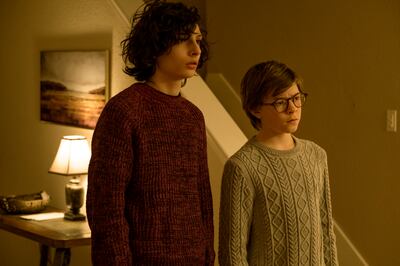“THE GOLDFINCH” — 2 1⁄2 stars — Finn Wolfhard, Nicole Kidman, Sarah Paulson, Luke Wilson, Ansel Elgort; R (drug use and language); in general release; running time: 149 minutes
SALT LAKE CITY — For being based on a Pulitzer Prize-winning novel, “The Goldfinch” falls surprisingly short.
John Crowley’s film weaves between two timelines to tell the tumultuous story of a young boy who recovers a priceless painting from a museum bombing.
In the first timeline, set sometime after the 2008 recession, we pick up with young Theo (Oakes Fegley) only hours after losing his mother in a terrorist bombing at the Metropolitan Museum of Art. At first he is taken in by a friend’s family, where he becomes a surrogate son to matriarch Mrs. Barbour (Nicole Kidman). He befriends a girl named Pippa (Aimee Laurence), who also survived the blast, and lives at a reputed Manhattan antique store called Hobart and Blackwell.

But just as life starts to gain traction, Theo’s delinquent father Larry (Luke Wilson) sweeps in with his girlfriend Xandra (Sarah Paulson) to claim his son — and more specifically, the money Theo’s mother left him that should cover some gambling debts. Theo then relocates to Las Vegas, befriends a Ukrainian boy named Boris (Finn Wolfhard) and sets down a path of dysfunction and substance abuse.
The second timeline picks up years later, after Theo (played as an adult by Ansel Elgort) has returned to New York, completed college and started working full-time at Hobart and Blackwell. Here he reconnects with the Barbour family and pursues a relationship with their daughter Kitsey (Willa Fitzgerald), though his heart remains with Pippa (Ashleigh Cummings).
The common thread between the two timelines is a priceless 17th-century painting called “The Goldfinch” that was supposedly destroyed in the museum blast. As it turns out, Theo took the painting with him secretly, and as the two timelines move forward, we see how the small piece of celebrated artwork shapes the rest of his life.
Without having read the source material, it’s difficult to pinpoint the origin of where things go wrong. Though the individual plot threads show potential, “The Goldfinch” tends to veer back and forth in a way that prevents its elements from flowing together gracefully, and it almost feels like the film would have been better as two separate movies — especially when the third act takes a pretty substantial genre-bending turn.

To get the story to fit together, too often “Goldfinch” relies on implausible chance meetings, and frequently its most interesting action happens off-screen, only to be recounted through a character’s expository dialogue. And the film’s persistent moodiness only makes the film’s 149-minute run time feel longer.
But fans of Donna Tartt’s novel may feel differently, and viewed at a distance, “The Goldfinch” does paint an interesting story. But up close, the colors are dull and there’s definitely the sense that the material could have worked better in a different frame. Ultimately, Crowley’s film just picks more fights than it can finish.
Rating explained: “The Goldfinch” is rated R for intermittent R-rated profanity, some mild violence and sexual content/references, and several depictions of substance abuse.

